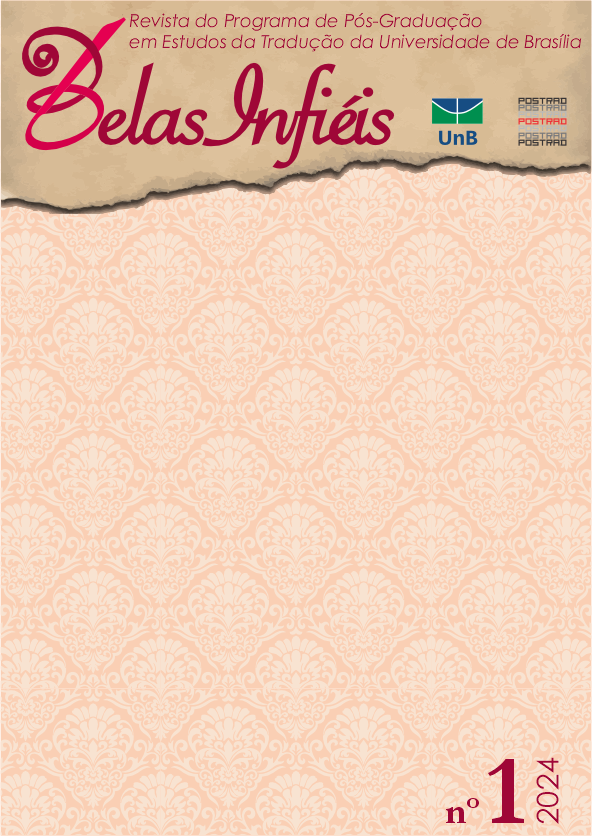Uma tradução de “A Bird of Bagdad”, de O. Henry
DOI :
https://doi.org/10.26512/belasinfieis.v13.n1.2024.51549Mots-clés :
O. Henry. Strictly Business. “A Bird of Bagdad”. Tradução literária.Résumé
Este artigo apresenta uma tradução do conto “A Bird of Bagdad” (1910), de O. Henry, para o português brasileiro. O. Henry tornou-se popular ao escrever sobre pessoas comuns, e ambientou muitos de seus contos na cidade de Nova York. “A Bird of Bagdad” é bastante representativo tanto do estilo de O. Henry quanto de sua temática nova-iorquina. Publicado originalmente na coletânea Strictly Business: More Stories of the Four Million (1910), o conto em questão traz a história do proprietário de um pequeno restaurante que sai à noite em busca de emoção — de desconhecidos com casos interessantes para contar e aos quais possa oferecer ajuda. Em uma de suas caminhadas, encontra um jovem que precisa solucionar um enigma. A presente tradução preocupa-se com refazer as particularidades das falas das personagens em diálogo, que cumprem um papel importante no efeito humorístico do conto, e o jogo de palavras que compõe o enigma, elemento crucial no desenvolvimento do enredo.
Téléchargements
Références
Henry, O. (2000). A Bird of Bagdad. In O. Henry, Strictly Business. https://www.gutenberg.org/files/2141/2141-h/2141-h.htm
Sauer, P. (2019). The History of O. Henry’s “The Gift of the Magi”. Smithsonian Magazine. https://www.smithsonianmag.com/history/history-o-henrys-gift-magi-180973840/.
The Portal to Texas History. (n. d.). O. Henry Collection: About O. Henry. https://texashistory.unt.edu/explore/collections/OHENRY/.
Téléchargements
Publié-e
Comment citer
Numéro
Rubrique
Licence
(c) Tous droits réservés CC BY 2024

Cette œuvre est sous licence Creative Commons Attribution 4.0 International.
Copyright Statement
Given the public access to this journal, the texts are free to use but requires the recognition of the original authorship and initial publication in this journal to be properly stated.
The journal allows the use of works published for non-commercial purposes, including the right to submit the work to publicly accessible databases. Published contributions are the sole and exclusive responsibility of the author(s).
- When submitting papers to be evaluated by the Belas Infiéis journal, the author(s):
- Declare that the contents of the contributions are original and of their original creation, being entirely responsible for their content if there is an objection by third parties.
- Claim to be aware that they should not commit academic plagiarism.
- Declare that the manuscript has not been published, completely or partially, in Portuguese or another language. If it is a translation it should be submitted to the Translated Articles section.
- Declare that the manuscript is not being evaluated by other journals.
- Declare that the manuscript was not submitted to another journal simultaneously.
- Commit(s) to inform the journal of any kind of error or inaccuracy in their contribution (published, in evaluation or in editing) and to collaborate with the editors to make due corrections of the article (when in evaluation or editing) or erratum/retraction (after publication).
- Declare that there is no conflict of interest regarding the published work.
- Authorize its release if it is accepted for publication without any kind of monetary compensation.
- Agree to assign non-exclusive rights to publication to the magazine, remaining free to make their contribution available in other media as long as the publication of the first version in Belas Infiéis magazine is mentioned. They also authorize Belas Infiéis to assign their texts for reproduction in content indexers, virtual libraries and similar platforms.
- Maintain copyright and grant the journal the right of first publication, the work being licensed under theCreative Commons Attribution License.
- Is/Are allowed and encouraged to publish and distribute their work online after the editorial process, which may increase the impact and citation of the published work.
- Authorize the editorial team to make textual adjustments and to adapt the article to the publication rules, when necessary.



















